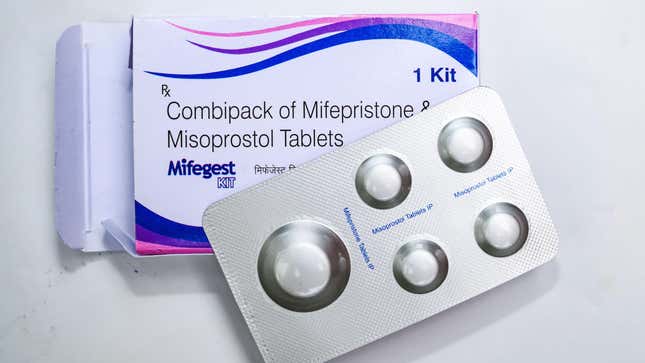The 2024 Forecast for Abortion Is… Shitstorm
It’s the 51st anniversary of Roe v. Wade, and between looming court decisions and messy ballot fights, 2024 will be another crucial year in our post-Roe world.


2024 is an election year, which automatically means that, for better or worse, it’s going to be a big year for abortion rights. Frankly, every year ever has been a big year for abortion, but it’s already clear that this one will be especially big.
Today marks the 51st anniversary of Roe v. Wade—our second since the Supreme Court overturned the landmark decision in 2022. In our astonishingly brutal post-Roe world, pregnant women can be denied time-sensitive care while a hospital consults its legal team, and a child rape victim from Ohio can be forced to travel to Indiana for abortion care. But we’ve also witnessed unprecedented levels of grassroots mobilization for abortion rights.
This year will inevitably see the same push-and-pull of horrors and resistance: For starters, according to The 19th, activists in 11 states are working to get abortion on the ballot in November—a quest that’s already proving contentious in states like Florida and Missouri, where top Republicans are fighting tooth and nail to stop them. Outside of elections, 2024 will also be a major year for abortion rights in the courts: The Supreme Court will issue a ruling on medication abortion and also decide if Idaho can actually ban emergency rooms from offering stabilizing abortion care. The Center for Reproductive Rights is also leading lawsuits in four different states on behalf of women whose lives were endangered by abortion bans.
Despite all that, Jennifer Driver, senior director of reproductive rights at State Innovation Exchange (SiX), told Jezebel she sees some “bright spots and places for optimism,” especially in state legislatures floating bills to expand abortion rights or repeal dated anti-abortion laws: “There are a lot of moving pieces, from both lawmakers who want to protect abortion and lawmakers trying to restrict it.” In other words, the fight for reproductive rights in the U.S. is only going to get wilder as we continue to navigate these deeply confusing, deeply horrifying post-Roe waters. Here’s what to look out for in 2024.
2024 is a big year for ballot measures and Republican obfuscation

Since the Supreme Court overturned Roe, reproductive rights have been on the ballot in Kansas, Michigan, Kentucky, Vermont, California, Montana, and, most recently, Ohio—and they’ve won everywhere. Now, organizers in Arizona, Florida, Montana, Maryland, Missouri, Nebraska, Nevada, New York, and South Dakota are trying to put proposals on their respective November ballots to enshrine abortion rights in their state constitutions. Organizers in Arkansas are trying to get a measure to repeal the state’s abortion ban while organizers in Colorado are trying to push a measure that would lift a ban on public funding for abortion.
And where abortion rights activists in states like Missouri and South Dakota are trying to enshrine a right to abortion to repeal their active bans, New York and Maryland—blue states where abortion is legal—are proactively trying to create constitutional rights to abortion to prevent future bans from ever taking effect.
Meanwhile, abortion rights activists in Missouri and Florida have already faced substantial pushback and disinformation efforts from top Republicans in their states. In Missouri, for example, state officials last year tried to block the proposed ballot measure by lying that a right to abortion would cost the state “upwards of $12 billion” and that the proposed measure would allow abortion until “live birth.” (Quick fact check: 100% false!) Abortion rights activists ultimately defeated the Republican secretary of state, which allowed them to begin the signature collection process. And in Florida, Ashley Moody, the Republican attorney general, is also fighting the proposed abortion ballot measure with inaccurate fearmongering. In October, she claimed the proposed measure’s language is unclear about where it stands on limiting abortion based on viability and filed a suit challenging this language in the conservative state’s Supreme Court, which has until April to issue a ruling.
We’ve been seeing desperate tactics like these from Republican officials in each state where abortion’s gotten on the ballot—and we’ll likely see some version of this in every state as we get closer to November.
Republicans will continue-slash-escalate their disinformation campaigns

Just as Republicans in Missouri lied about abortion rights costing $12 billion, be prepared for Republican officials to continue to challenge abortion rights ballot measures—and candidates who support abortion rights—with the same disingenuous bullshit about Democrats supporting abortion past “viability.” Not only is this simply not true, it fundamentally misunderstands that “viability” isn’t a universal time stamp. Of course, anti-abortion politicians have never exactly played by the rules—nothing, not even aggressive voter suppression, has ever been off the table.
-

-

-

-

-

-

-

-

-

-

-

-

-

-

-

-

-

-

-

-

-

-

-

-

-

-

-

-

-

-

-

-

-

-

-

-

-

-

-

-









































